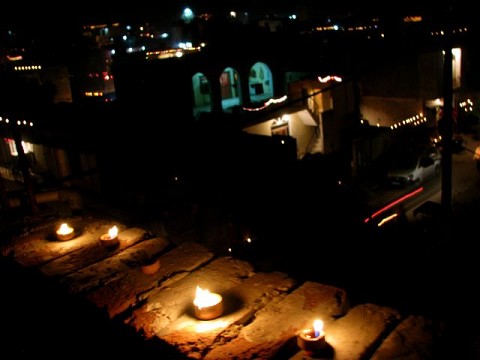
 The word दीपावली literally translates as a row of lamps in Sanskrit. It is traditional for adherents of Diwali-celebrating faiths to light small clay lamps filled with oil to signify victory over the the evil within an individual. …
The word दीपावली literally translates as a row of lamps in Sanskrit. It is traditional for adherents of Diwali-celebrating faiths to light small clay lamps filled with oil to signify victory over the the evil within an individual. … While Diwali is popularly known as the “festival of lights”, the
most significant spiritual meaning is “the awareness of the inner
light”.
beyond the physical body and mind which is pure, infinite, and eternal,
called the Atman.
Just as we celebrate the birth of our physical being, Diwali is the
celebration of this inner light, in particular the knowing of which
outshines all darkness (removes all obstacles and dispels all
ignorance), awakening the individual to one’s true nature, not as the
body, but as the unchanging, infinite, imminent and transcendent reality. With the realization of the Atman comes universal compassion,
love, and the awareness of the oneness of all things (higher
knowledge). This brings Ananda (inner joy or peace).
The light of the righteous shines brightly, but the lamp of the wicked is snuffed out. (Prov. 13:8)
(about Christ) In him was life, and that life was the light of men. The light shines in the darkness, but the darkness has not understood it. (John 1:4-6)
 (words of Christ himself) See to it, then, that the light within you is not darkness. Therefore,
(words of Christ himself) See to it, then, that the light within you is not darkness. Therefore,if your whole body is full of light, and no part of it dark, it will be
completely lighted, as when the light of a lamp shines on you. (Luke 11:35-36)
(and about when God establishes His Kingdom on earth) I did not see a temple in the city, because the Lord God Almighty and the Lamb are its temple. The city does not need the sun or the moon to shine on it, for the glory of God gives it light, and the Lamb is its lamp. The nations will walk by its light, and the kings of the earth will bring their splendor into it. (Rev. 21:22-24)
subject to him. Yet at present we do not see everything subject to him. But we see Jesus, who
was made a little lower than the angels, now crowned with glory and
honor because he suffered death, so that by the grace of God he might
taste death for everyone. In
bringing many sons to glory, it was fitting that God, for whom and
through whom everything exists, should make the author of their
salvation perfect through suffering. (Heb. 2:8-10)









